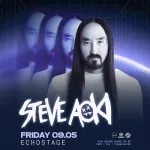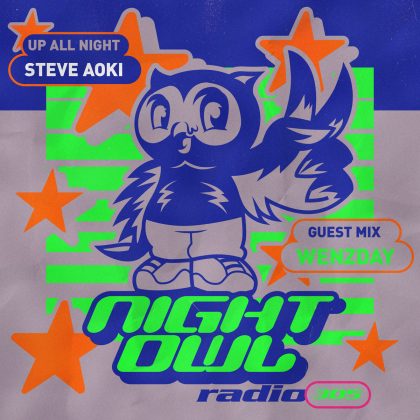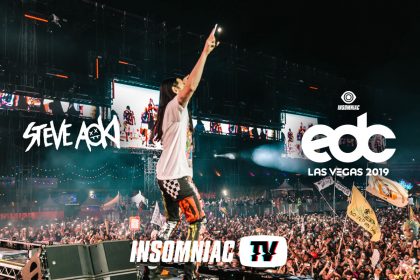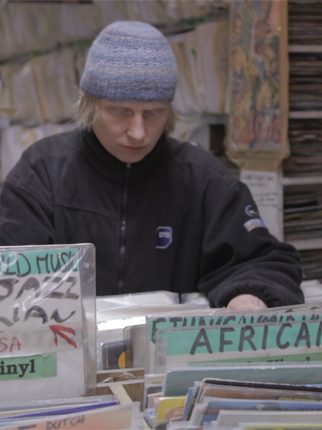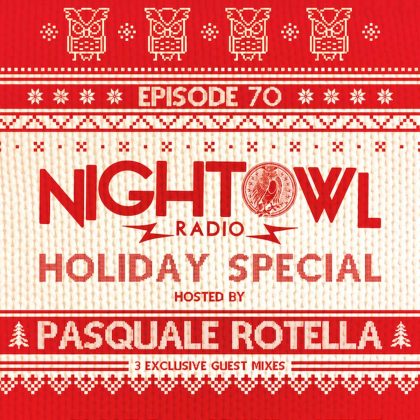Steve Aoki Reveals His Human Side in New Documentary ‘I’ll Sleep When I’m Dead’
Upcoming Event
There’s a scene at the beginning of I’ll Sleep When I’m Dead when—during a major press conference where he announces his most ambitious show to date at Madison Square Garden in NYC—Steve Aoki completely breaks down in a room full of media, close friends, music biz associates and complete strangers. Nearly in tears and virtually speechless, Aoki is at his most vulnerable as he reminisces about his deceased father in the middle of his speech. It’s a very touching and real moment, one rarely seen in the very public Aoki eye, and it immediately sets the film’s tone and scope.

While no stranger to the camera, Aoki unveils the most comprehensive look into his life with I’ll Sleep When I’m Dead, the newly debuted documentary streaming now exclusively on Netflix. The film gives viewers a look into his often hectic, always-thrilling existence—in the studio, on the road, in the air, and on and off the stage.

Sleep plants viewers firmly in the shoes of Aoki, giving a detailed look into his nonstop struggles and daily juggles as the hardest-working artist in electronic music today. Known for touring the world and performing more than 300 shows per year, Aoki somehow still finds time to run his Dim Mak imprint and lifestyle empire and produce full-length artist albums, having most recently released his two-part Neon Future project between September 2014 and May 2015.
But beyond the neon-lit surface, the documentary welcomes viewers deep into the producer’s personal life, as he lets down his guard for the first time ever and presents the Aoki story as told in complete cinematic form.

For the job, Aoki brought on director Justin Krook and producer David Gelb, who directed the acclaimed Jiro Dreams of Sushi documentary. Told through in-depth interviews with family, close friends, and fellow superstar artists and DJs, as well as personal stories from Aoki himself, Sleep unfolds an emotional roller coaster that digs beyond the flashing lights and booming beats and offers a look at life behind the cakes.
“[Krook] set out to build this narrative focusing on this particular kind of story that dove into a past that people didn’t really know about [me],” says Aoki. “It dove into a history of my family that I don’t really talk about, either. For me, [this film] opened a door that I’d never really opened, nor did I really want to talk about.”
For Aoki fans, Sleep only adds to the very familiar timeline of his storied, well-documented journey, from his early days growing up as a self-described outcast in Newport Beach, CA, and his formative college years at UC Santa Barbara, where he became a leader in the DIY punk/hardcore scene as founder of the Pickle Patch, a makeshift venue he operated out of his dorm. Sleep also highlights Aoki’s founding of Dim Mak Records, which celebrates 20 years as an independent imprint this year, and the label’s heavy influence on Los Angeles nightlife via its legendary Dim Mak Tuesdays weekly party.
Despite extensive club and festival performance footage, Sleep never feels like a marketing tool or promo reel; Aoki saves that hype for his various YouTube series. Instead, Aoki handed creative control to Krook, whose outsider-looking-in perspective offered a fresh take.
“I really like that it’s not necessarily about EDM, so to speak,” says Aoki. “This story is from someone that’s not even part of the electronic community and their way of looking into this world and [creating] a story out of it.”
This broader approach allows rabid fans and first-time onlookers alike to understand Aoki on multiple levels. When all is said and done, Sleep is neither a DJ story nor an EDM story; it’s an American dream success story.Anyone who’s ever watched Jiro Dreams of Sushi will immediately draw similarities to Sleep. On paper, both films focus on the relentless work ethic to which the main subjects subscribe: the militaristic operations of 85-year-old sushi master and restaurant owner Jiro Ono, and Aoki’s never-sleeping, always-touring schedule. But underneath it all, each documentary tells an endearing tale of family life and legacy and the ongoing search for parental love.

Nothing is truer for Aoki, who all his life chased the love and approval of his distanced father, Rocky Aoki, the world-famous Olympic athlete, self-made millionaire, and successful restaurateur, who founded the international Benihana restaurant chain.
“Growing up, it was always, ‘How do I impress my father? How can I show him I’m gonna be successful?’” Steve Aoki narrates in the early parts of Sleep. It’s a recurring theme throughout the entire film that sees him talk at length about the influence his father left on his personal and professional life and the lessons he passed down.

For the younger Aoki, winning over his father was his ultimate life goal—so much so, he emulated his lavish lifestyle. Rocky—a known daredevil who raced powerboats and set a world record for the longest balloon flight across the Pacific Ocean—brought performance and pizzazz to his Benihana restaurants, where chefs mix showmanship and entertainment live at the cooking table. Similarly, Steve Aoki brings a punk-rock attitude to dance music; he’s known for his wild onstage antics, in which he leaps off buildings and roofs to crowd-surf over fans in inflatable rafts and tosses cakes into the faces of begging devotees.
Through these parallels and heartfelt, never-before-heard confessions, Krook paints a vivid picture of the genuine Aoki living within.

“When you move as fast as I’m doing, you just keep carrying on—and then you think of a memory, and it brings you back to a place where you really missed those moments. The film does that for me.”
“Looking at the film now, it’s a bit heavy and a bit awkward at times, because I don’t really ever see myself talking like that, talking about my family,” says Aoki. “Then there’s moments where it’s really happy for me, because it brings back my past.
“When you move as fast as I’m doing, you just keep carrying on,” he adds. “And then you see a picture, [and] you think of a memory, and it brings you back to a place where you really missed those moments. The film does that for me. It really takes me back into this wormhole in the past.”
At the end of the film, after an hour of reflection, Aoki takes a moment to look ahead.

“I don’t think I was supposed to succeed as a DJ, and somehow I’m in a place where I’ve kind of made it, but I feel like there’s a lot more to go for me. I just feel so fucking fortunate and so lucky that I’m in this position, that I don’t want to sleep on it.”
The camera then cuts to a massive crowd shot, with CO2 cannons blasting off and giant LED screens shining bright in the background.
Then, in big, bold, all-caps letters, Aoki’s mantra finally appears: I’LL SLEEP WHEN I’M DEAD.
I’ll Sleep When I’m Dead is streaming now exclusively on Netflix.
John Ochoa will sleep when he can. Follow him on Twitter.
Follow Steve Aoki on Facebook | Twitter | SoundCloud

